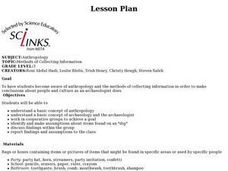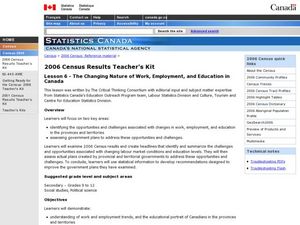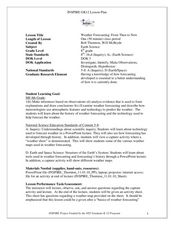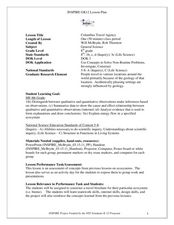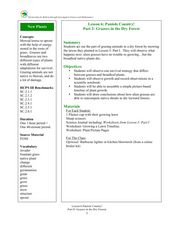Curated OER
Germination Inhibitors
In germination experiment activity, students conduct the following lab activity. Students determine the effects of another tomato on germinating seeds. Students answer the following questions to analyze their experiment.
Curated OER
Political Science: Political Analysis Through Satire
Students identify, analyze and explain examples of politcal satire. They discuss the role of political satire in the democratic process and create and present examples of political satire.
Curated OER
What is a Living Thing, and How Does a Living Thing Respond to Its Environment?
Learners investigate how living things interact with their environment. In this living things lesson, students complete lessons for science investigations on what living things have in common. Learners study cells, complete...
Curated OER
Methods of Collecting Information
Third graders examine a bag or box of soil containing items that they dig for. Their task is to become detectives to make conclusions about the area from which the items came as real archaeologists do.
Curated OER
What Does Life Look Like Under a Microscope?
Learners discover cells make up all living things. In this life science lesson, students investigate living organisms and the cells that create them. Finally the learners create a testable question, conduct an investigation, and draw...
Curated OER
Impact!!
Students perform a science experiment. In this algebra lesson, students collect data from their experiment and create a graph. They analyze the graph and draw conclusion.
Curated OER
Air and Air Pressure
Learners explore air and air pressure. In this science lesson plan, students find air and discover that it takes up space, has weight, and exerts pressure as they complete an activity.
Curated OER
Teaching the Scientific Method Using Adhesives
Middle schoolers research on the history of adhesives. In this science instructional activity, students select one test to use in finding the stickiness of adhesives. They collect data and formulate a conclusion.
Curated OER
Floating Soap
Students explore the density of soap. In this science lesson, students conduct an experiment to find which types of soap will float. Students make a hypothesis and record their observations.
Curated OER
Electric Circuits
Fourth graders investigate complete and incomplete circuits. Using an electrical kit that includes a D-cell battery, wiring, and a flashlight bulb, they construct a complete electric circuit that will light the light bulb. Students...
Curated OER
The African Burial Ground
Students analyze African American burial grounds. In this African American history lesson, students draw conclusions about African American communities in early New York and consider how archeology made it possible to study the communities.
Curated OER
Using Newsprint as a UV Detector
Young scholars investigate the effects of UV radiation. In this earth science lesson, students explain how the time of day relate to UV abundance on Earth. They determine if weather affects the amount of UV that Earth receives.
Curated OER
Student Designed Investigations Part 2 – Testable Questions, Predictions, Materials and Procedures
Young scholars create their own investigations. In this science experiments lesson, students use the steps of the scientific method to design an investigation. Young scholars share their findings on a poster.
Alabama Learning Exchange
Air is All Around You
Pupils investigate the mysteries of air. In this science instructional activity, young scholars participate in hands-on activities that require them to use the scientific inquiry model to study air.
Curated OER
The Changing Nature of Work, Employment, and Education in Canada.
Students identify the effect caused by change of employment and education. In this statistics lesson, students analyze data and draw conclusions. This assignment tests students' ability to use data correctly.
Curated OER
Weather Forecasting: From Then to Now
Eighth graders review the history of weather forecasting. For this earth science lesson, 8th graders identify the different tools used in forecasting weather. They explain why it's important to know the weather.
Curated OER
Columbus Travel Agency
Eighth graders research about their chosen ecosystem. In this life science lesson, 8th graders play the role of travel agents and create a travel brochure. They share this in class.
Curated OER
Circuits
Students draw a schematic diagram of parts needed to build an op-amp. In this physics lesson, students test the operation of their machine. They graph and analyze data using excel.
Curated OER
Unknown Element Project
High schoolers work with a partner to determine the identity of an unknown element based on given descriptions. Groups use classroom textbooks, encyclopedias, and science internet sites to identify their unknown element then write a...
Curated OER
What Are Caves All About?
Students explore materials within their science group and figure out what they can be used for. They also contribute in a group discussion about stalactites and stalagmites and create their own stalactite using the materials given to...
Curated OER
Comparing Seeds
Students explore the process of growing plants from seeds. In this hands-on science experiment, students observe different seeds (store bought vs. those directly from food items) and predict growing patterns.
Curated OER
Lesson 6: Paniolo Country Grazers in the Dry Forest
Learners explore grazing animals in a dry forest. In this science lesson, students act out the role of a grazer in the dry forest. Learners cut their growing lawn and observe what happens after being cut. Students explore differences...
Curated OER
Conserving Resources by Watering Efficiently
Students determine a watering schedule that promotes healthy grass growth. In this plants and natural resource conservation lesson, students plant grass seed in liter bottles and follow two different schedules that include "more...
Curated OER
Relative Dating in Archaeology
Young scholars create a timeline that explains how ancient cultures used artifacts. In this Relative Dating in Archaeology instructional activity, students examine artifacts and draw conclusions about their origins. Then young scholars...





